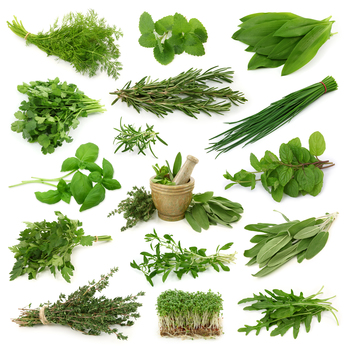Anxiety herbs
Anxiety disorders can be bewildering, overwhelming and debilitating. It is, therefore, quite understandable that people who are  suffering from anxiety disorders will try almost anything to gain balance and calm in their lives.
suffering from anxiety disorders will try almost anything to gain balance and calm in their lives.
More and more people are turning to natural remedies, and in particular herbs to relieve the symptoms which can be experienced with anxiety disorders. It is important to remember that even natural remedies can interfere with conventional medication and can have unwanted side-effects, so before you start a course of any alternative medication you should always consult your doctor.
You may also like to see our feature on herbs for mental health, which includes everyday herbs and their benefits for a wide variety of ailments.
Herbs and natural remedies for anxiety
The list of herbs which people have found helpful for the symptoms of anxiety is endless, so we will take a look at the most commonly used herbs, their suggested benefits and any unwanted side-effects.
Kava kava
The root of the Kava is used to give a sedative effect. It is said that Kava works on the central nervous system. The root is ground into a brownish powder which can be absorbed into the system quickly. The powder can be mixed with water and taken as a drink or it can be placed into capsules and swallowed. People who have taken kava kava have reported feeling a state of relaxation, mild euphoria or feeling more comfortable in social situations. Others have reported feelings of drowsiness.
Ginseng
Ginseng is claimed to improve circulation to the brain helping with mood and concentrations. Ginseng is also used as an aid to virility. There have been reports that high dosages of ginseng can cause overstimulation, restlessness, rapid heartbeat, anxiety, headache, and insomnia. It is particularly important not to take ginseng without prior discussion with your doctor if you have a heart condition or high blood pressure. It is also reported that ginseng can interfere with the benefits of antidepressant medication.
Rhodiola
It is claimed that rhodiola supports the healthy function of serotonin. Because of this claimed function rhodiola is suggested to help reduce anxiety, mental fatigue and poor mood. Rhodiola is also used to support cognitive functions such as memory and attention. Further beneficial claims include alertness, anti-aging properties and weight loss. Rhodiola can cause anxiety and the "jitters". Be cautious about buying a brand that also contains caffeine. It has been noted that Rhodiola has a stimulating effect at lower amounts and a sedating effect at higher amounts.
Bacopa
Bacopa is often used as a calming agent with claims that it could reduce nervousness and stress. Other beneficial claims are improved sleep, improved headaches, less irritable and boosted memory. There are reports that bacopa can help with symptoms of depression. Clinical trials have been conducted on animals and there is little evidence of how or why this should benefit human subjects.
St. John’s Wort
St. John’s wort has become a popular herb extract because of claims that it helps with anxiety and depression. It is reported to work by inhibiting the reuptake of the neurotransmitters serotonin and dopamine. St. John’s wort can cause sensitivity to the sun’s ultraviolet rays. It can also cause allergic reactions, stomach upsets, tiredness and restlessness. St. John’s wort can also interfere with the effectiveness of other drugs such as warfarin, birth control pills and many other medications. It should never be taken in conjunction with prescribed antidepressant medication.
Valerian
Valerian is used for the relief of several conditions including sleeping problems, digestive complaints nervousness, trembling, tension headaches and palpitations. Valerian can be taken in different forms which include capsules, teas, tables or liquid extract. Valerian may cause over-sedation or over-stimulation. It can also cause agitation, mouth sores and allergic reactions. Some people have reported having hallucinations and changes in vision.
Meadow Sweet
Meadow Sweet is claimed to relieve the headaches that are associated with stress and anxiety disorders. It can be taken as a tea or in tablet form as a dietary supplement. The reason for any benefits which may be felt from using this herb is unknown. Meadow Sweet should never be taken by people who are sensitive to aspirin and it is unsuitable for children.
Passion Flower
It is claimed that passion flower (also known as passiflora) relieves intermittent nervousness, anxiety and panic attacks. It is the vine of the passion flower that is said to contain the soothing effects. People who have tried passion flower have reported that the effect is one of calmness and balance. Pregnant women and women who are breastfeeding should never take passion flower.
Conclusions
Although many people have found benefits from taking herbs to ease the symptoms of anxiety and depressive disorders they should be taken with caution. Many people believe that if you are taking a ‘natural’ product it cannot harm you but this is plainly not the case. Toadstools and fungi are natural but have the potential to make people very ill or worse! We would urge extreme caution when considering taking any supplements such as herbal remedies and it is imperative that you seek the advice of your doctor before you begin any course of herbal treatment.
You may also like to see our 'food for good mental health' feature which tells us which foods contain vitamins and minerals, good for different conditions.





